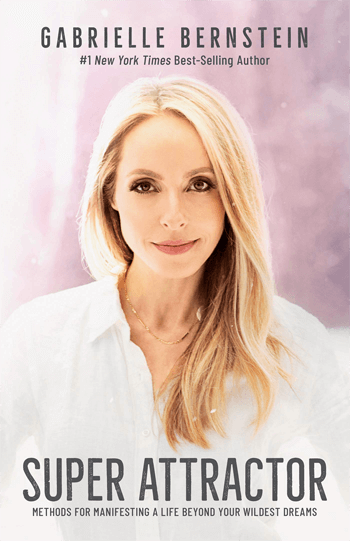How to Be a Super Attractor and Manifest the Life You Want

Manifesting: It seems so simple, but even spiritual teachers like Gabrielle Bernstein will tell you that they get stuck sometimes. Bernstein is the author of six bestselling books, including Spirit Junkie, her memoir about getting sober and
choosing spirituality. Her path to recovery has helped many people, and her message is compassionate: Difficult situations are learning experiences, and a willingness to forgive yourself is the first step to realignment.
Manifesting: It seems so simple, but even spiritual teachers like Gabrielle Bernstein will tell you that they get stuck sometimes. Bernstein is the author of six bestselling books, including Spirit Junkie, her memoir about getting sober and choosing spirituality. Her path to recovery has helped many people, and her message is compassionate: Difficult situations are learning experiences, and a willingness to forgive yourself is the first step to realignment.
But starting a spiritual practice doesn’t require falling apart first, says Bernstein. In her new book, Super Attractor, the goal is to make aligning with the universe a daily choice. That doesn’t mean we’re always perfect, says Bernstein. But once we’ve chosen to fully forgive ourselves, she explains, we can begin to act like a magnet—a super attractor—for manifesting what we want in life. And what Bernstein really wants people to know is that the universe always has our back, no matter how many times we make mistakes, feel lost, or get out of alignment. It all starts with forgiveness and the desire to feel better. And, says Bernstein, “we all deserve to feel good.”
P.S. Tune in to the goopfellas podcast to hear Bernstein dive deeper with cohosts Seamus Mullen and Will Cole as they open up to spiritual transformations.
A Q&A with Gabrielle Bernstein
I have been on a big journey of personal growth and spiritual development for the past fifteen years. I found out right before I started writing the book that I had conceived my son. My commitment to my pregnancy was to feel good, take it easy, and live the principles that I was writing about. The writing process brought me a lot of joy because it was a constant reminder that this was what I wanted to live. It wasn’t that I hadn’t been living these practices before, but I hadn’t had as big a reason to prior to this. I had always been living the practices but would still fall off and get hooked into old belief systems. This was my big threshold of choosing to make feeling good my highest priority.
It means that what you believe, you will receive. But we are always receiving—we’re just not always receiving what we want. Being a super attractor means that our focus is on feeling good—on what we believe are good-feeling emotions and good-feeling experiences—so that what we attract is that reflection, its likeness. When we focus on what’s working rather than what’s not working, when we’re focused on how we can feel better in this moment, how we can have more fun, that’s when we start to be full-blown super attractors.
I had a life coach who worked with me about fifteen years ago when I was first starting my business. I had said to her, “Wow, I’m manifesting all these things in my life because I believe so deeply in my work.” I manifested a story in the New York Times’s Sunday Styles section, I manifested these audiences coming out to see the work, and I felt really proud of my first book deal. I felt this universal support for the work I was doing. And she said to me, “You’re a super attractor.” That was the first time I took that in. I realized that when we feel good and we’re totally aligned with the positive feelings of the intentions that we’re putting out into the world, they will be very supported.
Abraham-Hicks, whom I reference a lot in the book, say, “A belief is just a thought that you keep thinking.” So the negative loop is this belief system that you’ve chosen based on a thought that you kept thinking, and the thoughts that we have on repeat are ultimately what can bring us the most discomfort. Those thoughts are often ingrained in us from childhood experiences, childhood trauma from stories that we picked up, even as infants. I’m so aware of it now having this baby in my life. He’s giving me such a high level of awareness of the things that we pick up. I can see he’s so resilient, but I also see how impressionable he already is.
We have to recognize what we’ve picked up along the way and how the experiences we had through our childhood made us who we are, good and bad. The belief systems that we carry are reflections of the times in our life when we had a story that said, “I’m not good enough” or “I’m not lovable” or “I’m not like someone else.” Those are stories we carry for decades until we begin to recognize them and heal them.
Yes, but I wouldn’t use the word “negative.” It’s not that we can’t be negative. We’re discerning. I wrote a book called Judgment Detox, and people said the same thing. They said, “What? So you’re never going to judge again?” I said, “No, you can be discerning.” There’s a difference between negative and judgmental and attacking, and attacking yourself, than just discerning something like, “Okay, that person isn’t right for me, or this job is no longer serving me.” And it’s not that we can’t be negative. Part of the healing process is to honor our emotions and feelings and let them out in the pursuit of feeling better.
I hope to help as many people as possible with this because it’s a really difficult thing. I wrote Super Attractor while I was pregnant. I had this excellent pregnancy and perfect labor and delivery, and then I was diagnosed with PPA four months postpartum, but I think I had been living with it for at least two or three months prior to that. I had insomnia and depression and anxiety, and it ultimately just brought me to my knees. It forced me to face the shame around mental health, and it’s given me a greater voice for mental health conditions because now I understand it.
It’s given me a greater voice for the mental health care we need at times and the medical system and why it’s important to not be so spiritual that you can’t take medication. That can be really dangerous. I think things are definitely overly prescribed in our culture—we all know that—but in the case of something like postpartum anxiety and depression, sometimes I think we are underprescribed. Many women go a long time without getting a diagnosis because of the shame: I’m supposed to be a mom and have it all together.
I’ve only since realized that I’ve probably had an anxiety disorder my whole life. This experience is the worse one by far—and I’ve had some really messed-up experiences getting sober and remembering trauma. But while it was the most difficult experience of my entire life, I’ve come out of it and am continuing to heal from it with so much grace because I was willing to once I had a diagnosis and accepted it. Even though I wasn’t better right away—I had to rely on a lot of support to get to a healthy and stable place—I was fully committed to feeling good no matter what. That was a commitment for myself, for my child, for my readers, for my husband, but mainly for myself. I also recognized that there were deep-deep-rooted fears that were living underneath that trigger, and it was also a perfect cocktail of a biochemical issue that caused the resurrection of traumatic memories, all the stuff that had happened to me.
The Choose Again method is beautiful. It’s that we simply recognize the repeated thought or the belief system that we keep going back to, and we ask ourselves, How does that make me feel? Then the second step is to forgive yourself for having had the thought and to forgive the thought. People don’t think about forgiving a thought, but forgiving a thought means that we let it off the hook, we take away its power, and we forgive ourselves for falling into that belief system. The third step is to choose again, to reach for the next best healing thought. This is really the premise of the work of Abraham-Hicks.
So for me, while I’m going through my postpartum journey, the next best healing thoughts are: I am getting better every day. I have support around me. I am going to be able to live through this and thrive and help other women. These are some thoughts that feel empowering and true to me, and they guide me to a better feeling, toward faith.
We use worry and fear as a way of falsely protecting ourselves from disappointment, from not feeling good enough, from not being able to achieve what we think we can achieve. We protect ourselves with fear and worry because we believe in the fear. We believe that if we obsess about the fear and we try to find solutions for the fear, that that will make us safe. But the irony is that we have to release the fear to fully feel safe.
When all of your energy and attention is focused on worry and chaos, you are creating inflammation in your body, you’re blocking your relationships, and you are blocking your attracting power. When you heal all of that, you can do less and attract more.
Yeah, I have found that this is the gift that the postpartum journey gave me. The worrying and the fears were what was taking me down, and some of it was logical, but most of it was not. I have come out of that recognizing that worry is a prayer for chaos, and the more energy I bring to the worry, the more I am likely to create that in my life. It’s not to say that my child’s well-being isn’t the most important thing on my mind all the time, but I know that living with faith gives him more freedom to thrive. And so I have made it my commitment to recognize that when there isn’t an issue in front of me, to ask myself what I’m worrying about. If there is an issue in front of me, then I need to seek solutions rather than problems.
I think that everyone suffers no matter what’s going on. We all have some kind of suffering. We could look as if everything is working out, but we worry all the time or we are anxious or we don’t think we’re good enough at our job. All that is required is a desire to feel better, and often that can come when someone just says the word or “there has to be a better way” or “I am willing to let go of this worry now.” It’s that simplicity of recognizing that you don’t have to hit a big bottom to be spiritual. You just want to see things with a different perspective.
Gabrielle Bernstein is the number-one New York Times bestselling author of The Universe Has Your Back and has written five additional bestsellers. Her seventh book, Super Attractor: Methods for Manifesting a Life Beyond Your Wildest Dreams, is out now.
